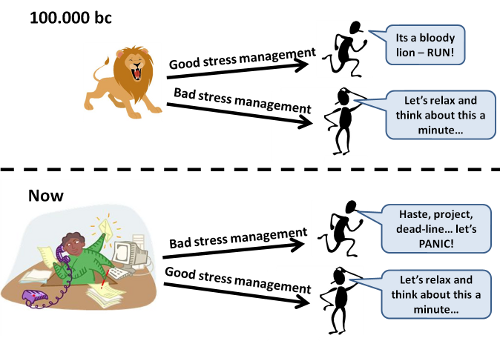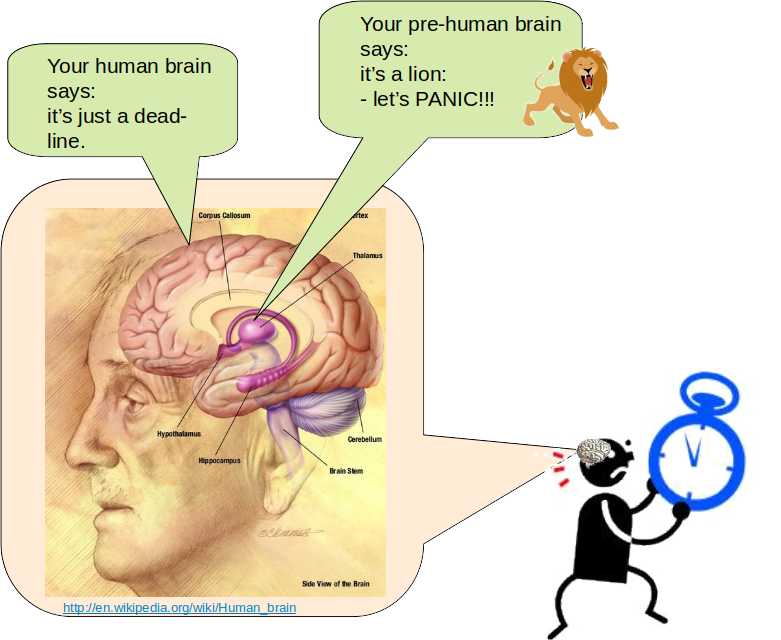Stress Management Part 2
Introduction
This is the second part of my five-part series about stress management. The first part can be found here: Stress Management Part 1
Early Symptoms
The first part of this Stress management blog series illustrated the general landscape of the Vicious Cycle of Stress. The main point is trying to stay in the Area of Normal Life (the upper part of the cone). In this post, we are going to talk about the Early symptoms that are important to know so that you are going to notice as soon as possible when you are about to slip to the lower unhealthier levels of the cone.
The Early symptoms can be summarized in the graph presented in the first part of this Stress management series: Your perspective in life narrows and your overall well-being is going down. The problem is that usually, this happens so slowly that you don’t realize what is happening until you already are there.
Test your stress level
There are early symptoms that you can use to check your stress level. The internet is full of stress management pages and if you feel that you are in the danger zone you should test your stress level. Some examples of these pages can be found using keywords “psychological stress online test”. But beware: some of these tests are just rubbish. Try to find a stress test that has some major clinical organization backing up (e.g. Mental Health Foundation, UK). Or consult your general practitioner.
List of Early Symptoms
You can also use this list of early symptoms to check your stress level:
- Memory. Do you feel that you cannot remember things as easily as you used to? Stress affects the brain in a physiological level so that your memory impairs.
- Concentration. Do you feel that it is harder for you to concentrate now than earlier? The physiological changes in the brain caused by stress also affect your ability to concentrate. You may feel that you cannot concentrate e.g. listening to the news, you are just sitting on your sofa and wondering what the news anchor has been talking about the last 5 minutes.
- Energy. You don’t have the energy to do things you used to do (go to jogging after work, see your friends…).
- Emotions. Your emotions are darker than they used to be. You feel down more often than you used to.
- Tension. You feel physical and mental tension almost daily. Mental tension is an odd feeling of threat even though you realize that there is no real physical threat in your life. The bodily tension can be felt e.g. in your stomach.
- Interests. The things that used to be interesting in your life don’t interest you any more or you feel you don’t have the energy to be involved with them anymore.
- Sleep. You don’t sleep as well as you used to. Sleep is a very sensitive indicator of your overall well-being, so listen to it. If you don’t sleep well there is something wrong and you definitely should do something about it. Bad symptoms are if you have problems to fall asleep (because of all those stressful things are making a major hassle in your mind on the bed) or you wake up 2-3 hours too early and can’t get back to sleep. Problems with sleep need to be addressed soon and with rigor: lack of sleep will make changes in your brain that might eventually start serious mental problems (like depression).
- Work. You don’t enjoy your work as you used to.
Why Do We Feel Stress Symptoms?
It’s all about evolution. See the picture below.

Stress management 100.000 bc and now.
The basic idea of the stress symptoms was good. 100.000 years ago when you were walking happily in the savanna and suddenly you saw a lion your body needed to react very rapidly: do I fight or flight? Your organs pushed stress hormones to your veins, your blood pressure raised and your psyche and your body were ready to do something. You ran and once in a safe place, your stress level returned soon to normal. Your brother who had much worse stress management ( i.e. worse stress management regarding that time = he didn’t panic when he saw the lion) wasn’t that lucky, he was eaten by the lion and didn’t pass on his genes (and those genes could provide us good stress management in our times). The end result is that we tend to stress (because the evolution decided that it is the wise thing to do). Nowadays it’s different. You seldom see lions on the streets but you feel “threat” or “insufficiency” in your ordinary everyday life at home or work. The problem is that your mental and physical stress level is turned on but won’t turn off. Your body doesn’t understand the difference between a lion and the haste in your ordinary life: it interprets that the on-going haste in your life means that there is a pack of lions running after you day in day out.

Stress management in the brain, designed by Nature.
When the stress level is turned on a too long time it will make psychological and physiological changes in your brain that are hard to cure. The most important thing of this post for you is to understand that the Early stress symptoms are an important indicator for you to know that there is something wrong in your life and you should do something about it (before things are going too ugly for you yourself to do anything about it anymore, but more about it in the next post).
The writer has double majors: Master of Arts (Psychology) and Master of Science (Software Engineering). The writer has spent his career in the field of software industry but still reads various psychology related articles with great interest.
Kari Marttila
Kari Marttila’s Home Page in LinkedIn: https://www.linkedin.com/in/karimarttila/
